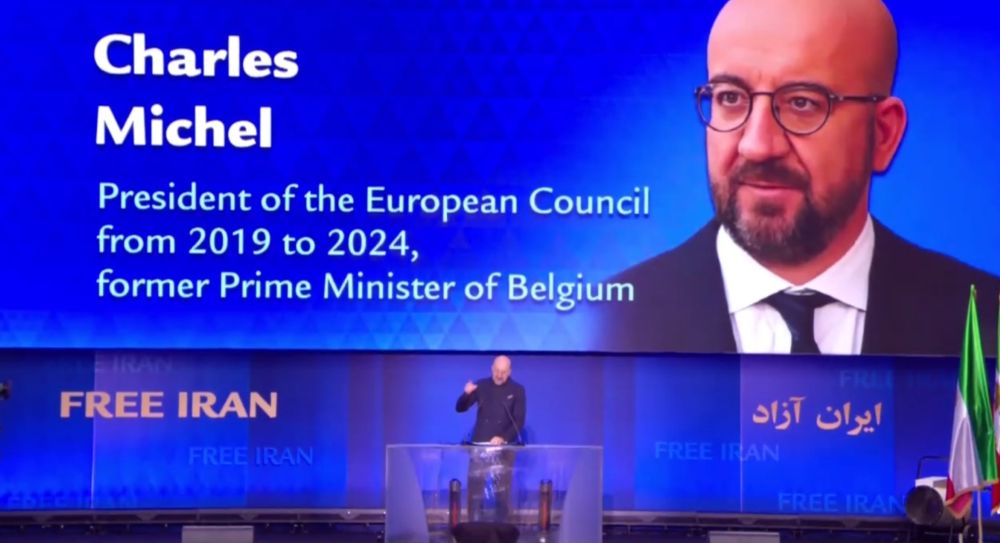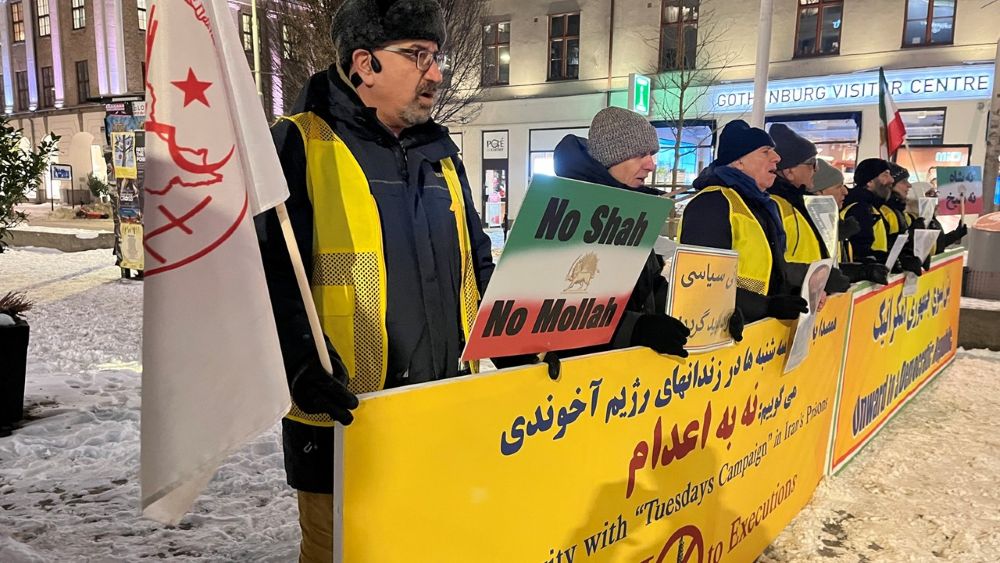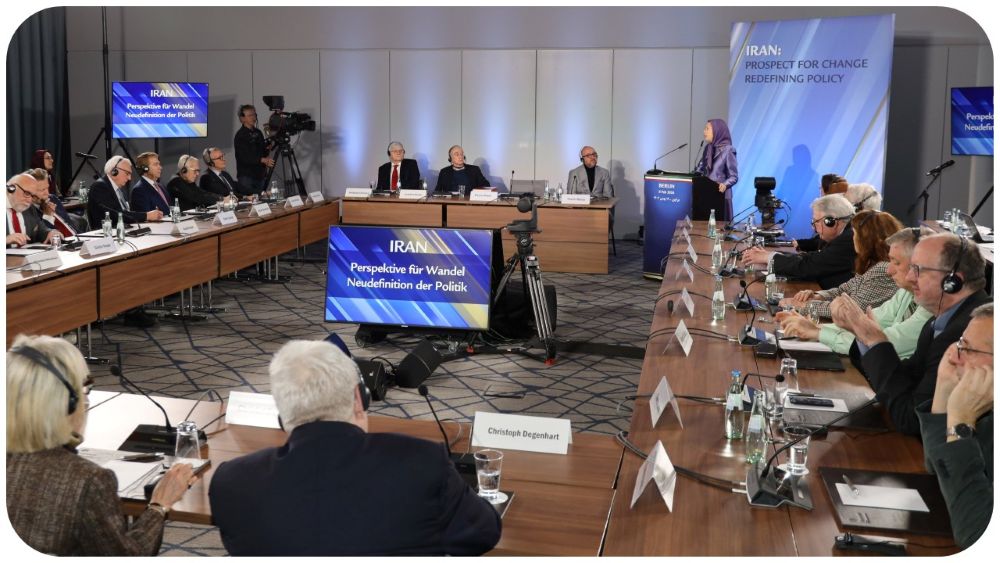On the brink of the U.N. General Assembly’s annual session, an online international summit, entitled “Trans-Atlantic Summit on Iran Policy, Time to Hold the Iranian Regime Accountable,” was held September 18. The Summit brought together Iranians in various countries around the world from 10,000 locations. Ambassador Giulio Terzi, former Italian Foreign Minister, joined the Summit.
Among the personalities who addressed the summit were 30 bipartisan U.S. lawmakers from the House and the Senate. Personalities including:
Senator Ted Cruz, Senator Roy Blunt, Senator Marco Rubio, Senator Bob Menendez, and dignitaries like Rudy Giuliani, former New York City mayor, General James Jones, National Security Advisor to President Obama (2009-2010), Newt Gingrich, 50th Speaker of the United States House of Representatives, Joseph Lieberman, former U.S. Senator, as well as a delegation of U.K. lawmakers, and Ambassador Giulio Terzi, former Foreign Minister of Italy.
Mrs. Maryam Rajavi, the keynote speaker of the summit
Mrs. Maryam Rajavi, the President-elect of the NCRI was the keynote speaker of the summit. She paid tribute to Navid Afkari, a rebellious national hero recently executed by the regime. Mrs. Rajavi said: “Faced with executions and massacres, the people of Iran urge the U.N. and the U.N. Security Council, in particular, to restore snapback sanctions stipulated in the six U.N. resolutions against the clerical regime in Iran.”
She continued,”Otherwise, Khamenei will continue to ravage the nation as his regime’s survival depends on murder and suppression. If Khamenei were to stop executions, he would lose control of the situation, and uprisings simmering in the depths of Iranian society would erupt and overthrow the mullahs’ religious fascism.”
At the summit, speakers demanded justice for over 30,000 MEK and other activists, political prisoners massacred in 1988. As a result they urged an end to the appeasement policy and requested those who ordered and carried out this great crime, who currently occupy high positions in the regime, to be brought to justice.
Ambassador Giulio Terzi, former Italian Foreign Minister joined to the summit. In his remarks, Ambassador Terzi said, “While the Iranian Embassies, Governmental offices and institutions which support directly or indirectly organization such as MOIS, IRGC, Hezbollah and their proxies should be promptly closed.”
Giulio Terzi, former Italian Foreign Minister
Madame Maryam Rajavi, dear friends of the NCRI, dear members of the Iranian Resistance and supporters of a free, humane, democratic and peaceful Iran,
UN General Assembly High Level’s Debate starting next Tuesday, 22 September will be preceded by a “special event” on: ‘The Future We Want, the UN We Need: Reaffirming our Collective Commitment to Multilateralism’.
It is indeed a crucial, visionary topic which would fit perfectly into any analysis, debate, negotiation or initiative aimed at radically changing the fundamentals of power in Iran; with the objective of freeing from their chains 80 million people enslaved and plundered by a theocratic, blood-thirsty dictatorship .
I did say that the situation of Iran “would fit” in such an ambitious special event about the “UN We Need” and our “Collective Commitment to Multilateralism”: Because a large part of the International Community, and the Iranian People have become more skeptical, and angry ,after the appalling failure of the UN Security Council to recognize huge Iranian threats, to the region and to the entire international community.
Under the present regime, Iran has been deserving for many years the definition of “Number One Terrorist State in the World”.
Incredibly, this is the same country for which EU member states and two UNSC permanent members, Russia and China, would like to lift the UN arms embargo; and by so doing, they would make Iran enormously more powerful; with huge amounts of new, sophisticated weapons; with much larger resources from a grown weapons trade with Russia and China, and other autocratic regimes; emboldened in its nefarious actions, terrorism, threats to the neighbors, directly and through its proxies.
As European and as a former diplomat directly involved for more than twenty years in the issue of Iranian nuclear proliferation, I feel regrettable the present European attitude on Iran: an attitude of self- censorship, and denial about many assessed Iranian violations of the non-proliferation regimes; a strategy of double standard depending on the convenience of the moment: applied by the European Union to the crimes against humanity committed by the Mullahs.
All that is even more shocking in during these days and hours!
The moment, for the EU3, is always in Iran’s favor. Shouldn’t we ask the President of the EU Commission, Ursula von der Leyen why the case of Navid Afkari was not mentioned in her speech about the EU’s “State of the Union”.
Why wasn’t it mentioned at least in a way similar to the way the case of Alexei Navalny was raised by Mrs van der Leyen?
Why tortures, prisons, and the hell inflicted to Navid and his family were not considered enough?
Why they were not enough to suggest immediate measures by the President of the EU Commission, such as a new “EU-Iran” policy and strategy: with the adoption of sanctions, and the snap-back of the arms embargo?
On Russian case Mrs. von der Leyenwas clear and consequential.
She said that international relations had become paralyzed by world powers which had taken Institution “hostage”, and said that “the poisoning of Navalny with an advanced chemical agent is not a one-off”.
She denounced “a pattern in Georgia, Ukraine, Syria, Salisbury, and in election meddling”, because she wanted to warn of the risks of closer ties with Russia.
The horrible crime committed against Navid – only 3 days before the Commission’s President took the floor in front of the EU Parlament – was not considered enough for her strong reaction:
Even in a genocidal framework of bloody repression, disappearances, killings in Iran over the last two years. A pattern never ended, and that only became more dramatic starting with the 1988 Massacre; followed 2 years later by the murder of Professor Kazem Rajavi in Geneva. That murder has been now put by the Swiss Judiciary in the proper framework of investigation: for crimes against humanity and genocide.
Even against such background, when it is about Iran the EU remains silent and behaves like an accomplice. And the regime feels emboldened in its terrorist strategy, even against Iranian expatriates in Europe, European officials and Institutions.
In July 2018, in Villepinte, France, a large Italian delegation might have met many deaths and casualties in the spectacular terrorist attack the Iranian intelligence had planned to carry out.
In the course of that yearly Convention – as you know, a gathering of around 100 thousand persons – Italian participants were together with hundreds of other foreign officials from more than sixty countries. French, Belgian, German and Austrian security services did execute an extensive operation to capture the perpetrators of the planned attack and the Iranian diplomat who was behind it.
A subsequent European Union’s resolution to include senior Iranian intelligence personnel in EU list of terrorists was important, but it was too little, too late. Serious pressure must be exerted on the Iranian regime.
The regime in Tehran must understand that it will pay a heavy price. A true European deterrence is needed.
The Iranian diplomats who do help the terrorists must be, all of them, indicted and prosecuted whenever the evidence is there; and expelled in case of illegal intelligence activities;
While the Iranian Embassies, Governmental offices and institutions which support directly or indirectly organization such as MOIS, IRGC, Hezbollah and their proxies should be promptly closed. The European Union still does not see in Iran a threat to the citizens of Europe, and some of the opponents of the regime who were assassinated or were on the assassination hit-list were European citizens.
We must raise our voice, and react: within the United Nations and all International Organizations which can make the difference. In bringing back Iran to Freedom, Rule of Law, Respect for Human rights and Human Dignity.”



